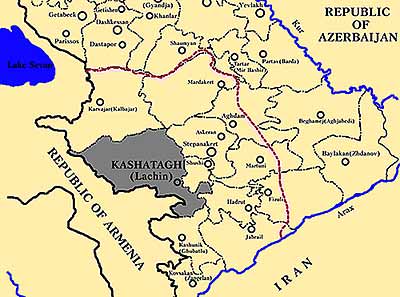December 11, 2007 (the date of publication in Russian)
Alexei Baliyev
THE KURDISH KARABAKH
Lachin corridor may acquire the same role as northern Iraq
 In early December, the Kurdish diaspora of Armenia, amounting to almost 60,000 people, endorsed current Prime Minister Serge Sarkisyan for Presidency at the national elections. The Armenian Kurds expect Sarkisyan to re-establish the Kurdish Autonomous District that once existed in the Lachin District of Soviet Azerbaijan.
In early December, the Kurdish diaspora of Armenia, amounting to almost 60,000 people, endorsed current Prime Minister Serge Sarkisyan for Presidency at the national elections. The Armenian Kurds expect Sarkisyan to re-establish the Kurdish Autonomous District that once existed in the Lachin District of Soviet Azerbaijan.
Since the end of the Karabakh war, Lachin District, along with four others, has been controlled by Armenian troops. In spring 1992, the local Kurdish population played a key role in breaking the siege of Karabakh and providing a vital territorial link between Karabakh and Armenia.
At the recent briefing at the Parliament of Armenia, Prime Minister Serge Sarkisyan demonstratively emphasized: "I am proud with the fact that ethnic minorities, residing in Armenia, will support my candidature at the oncoming Presidential elections".
In case the Kurdish autonomy is re-established, Lachin District is likely to become a mini-equivalent of Kurdish-dominated Northern Iraq. It is noteworthy that Iraqi Kurds are reported to espouse the project of Kurdish autonomy in Armenia.
At the same time, Armenian organizations in Iraq, Iran, Syria, Lebanon, Egypt and Cyprus, where the total number of the Albanian diaspora exceeds 200,000 people, issued a joint protest against "Ankara's oppression of Kurdish people and unlawful military intervention into Iraq", expressing "commitment to support the Kurdish liberation movement in Turkey".
The statement was also signed by ASALA, the successor of the Armenian Secret Liberation Army, founded in 1960s with the announced goal to re-establish Armenian control over Miatsum (Western Armenia), which became a part of Turkey on the agreement between Kemal Atatürk's government and Soviet Russia. ASALA cooperated with then-underground Dashnaktsutyun Party, whose armed groups physically exterminated the Turkish officials, responsible for the genocide of Armenians in the Ottoman Empire and Kemal's Turkey in the beginning of the last century.
Since late 1970s, ASALA, under pressure from both USSR, the United States and the European Community, restricted its activity to peaceful propagandist actions; in their turn, European parliaments and the US Congress agreed to officially envisage the issue of recognition of genocide of Armenians in Turkey in 1915. Before that agreement, ASALA carried out 60 subversive operations in Turkey, teaming up with Kurdish fighters. Until today, Miatsum's government-in-exile exists in Lebanon under the auspices of ASALA, though not being recognized by international institutions or states. These Armenian activists maintain relations with Iraqi Kurdistan and the Kurdish Workers' Party (PKK).
According to Azerbaijani analyst Rashid Nourani, an agreement on permanent cooperation was signed in Bekaa Valley, Lebanon, as far back as in spring 1980. It is noteworthy that PKK activists traditionally take part in annual public rallies at the monument to the Victims of 1915 Genocide in Yerevan.
Farkhad Mardin, co-chair of the Kurdish national-cultural autonomy in Russia and Representative of Kurdish communities in Russia and CIS, claims that the allegations of Armenia's assistance to the Kurdish guerilla war in Turkey are fraudulent, being spread deliberately in order to discredit Yerevan on the international scene and to sabotage approval of Resolution 101 of the US Congress, Resolution, recognizing the fact of genocide in 1915. Mr. Mardin insists that Turkey is reluctant to recognize the 1915 genocide primarily from fear that in case this legislation is passed, US Armenians might raise the issue of Miatsum's political status.
Yury Nabiyev, advisor of Iraqi Kurdistan's diplomatic office in the CIS, told this author that the Armenian and Kurdish communities are going to jointly raise the issue of self-determination rights. He believes that the Republic of Armenia and Iraqi Kurdistan envisage broad perspectives of relationship which are going to be analyzed by a joint top-level commission.
Number of shows: 2412
 ENG
ENG 

 ENG
ENG 
